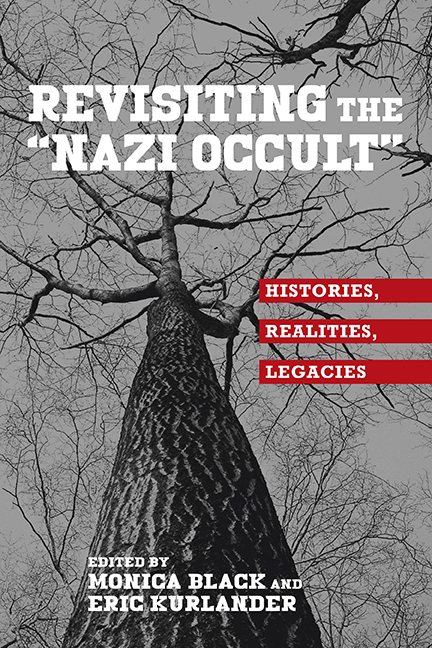Introduction
Published online by Cambridge University Press: 10 June 2021
Summary
WHEN WE, THE EDITORS OF THIS VOLUME, solicited essays from our contributors, our main goal was to showcase exciting new historical approaches to that perennial topic of scholarly, pseudoscholarly, and popular interest—the Nazi occult. From supposed SS expeditions in search of the “Spear of Destiny” to Heinrich Himmler's fascination with witchcraft or Adolf Hitler's “Jewish clairvoyant,” there has been no shortage of material over the decades suggesting a close connection between Nazism and the occult. Exemplified in such films as Raiders of the Lost Ark, computer games like Castle Wolfenstein, and comic books like Hellboy, the popular image of the Nazi darkling, seeking paranormal assistance in the interest of world domination, persists. The output on these topics, however, while vast, has been decidedly uneven. Many works are more speculative than grounded in archival spadework. The handful of serious studies, meanwhile, tends to focus on the period before 1933, leaving open the relationship between German esotericism and National Socialism in practice, let alone any possible connections to be drawn between Nazism and occultism after 1945.
To be clear from the outset, it is not our principal aim to establish a new consensus on the question of the “occult roots of Nazism,” which has traditionally involved determining the extent to which esoteric or occult philosophies, “secret cults,” or millenarian networks informed the creation of Nazism or were used to further its goals. We endeavor instead to solicit a variety of responses to that question, responses that both expand on and transcend the traditional range of themes and field of inquiry associated with Nazi occultism. As early as the interwar years, members of a generation of scholars who would be forced into exile to escape the Holocaust—such as Ernst Bloch, Theodor Adorno, Lotte Eisner, Fritz Stern, and George Mosse—were emphasizing the role of mythology, irrationalism, and esotericism in facilitating National Socialism's rise and its crimes. Probably the last and most important work in this genre, Nicholas Goodrick-Clarke's Occult Roots of Nazism, was published in the mid- 1980s. It represented the first serious scholarly analysis of Nazi occultism based on exhaustive research into archival and published primary sources.
- Type
- Chapter
- Information
- Revisiting the "Nazi Occult"Histories, Realities, Legacies, pp. 1 - 20Publisher: Boydell & BrewerPrint publication year: 2015



